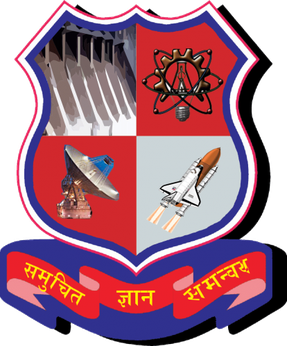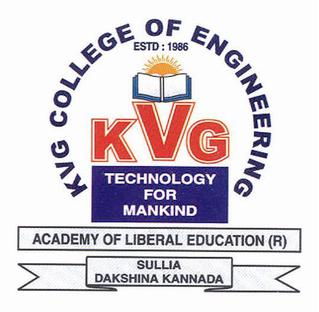
Ghanshyam Das Birla was an Indian businessman and member of the Birla Family.

Veermata Jijabai Technological Institute (VJTI) is a state funded college located in Mumbai, Maharashtra, India. Founded in 1887 and formerly known as the Victoria Jubilee Technical Institute, it adopted its present name on 26 January 1997. VJTI is an academically and administratively autonomous institute, but it is affiliated to the University of Mumbai. The institute is financially supported by the Government of Maharashtra.
An institute of technology is an institution of tertiary education that specializes in engineering, technology, applied science, and natural sciences.

Odisha University of Technology and Research (OUTR) formerly College of Engineering and Technology, Bhubaneswar (CETB) is a public unitary technical university under the state government of Odisha located in Bhubaneswar, the capital of Odisha, India. It was established in 1981, by Government of Orissa, as a constituent college of Odisha University of Agriculture and Technology. Students are admitted to the college through the Joint Entrance Examination (main) merit list of Government of India. The Institute is accredited by the National Board of Accreditation. The Government of Odisha has granted unitary university status.

Birla Institute of Technology, Mesra is a government funded technical institute (GFTI) situated at Ranchi, Jharkhand, India. It was declared as a deemed university under Section 3 of the UGC Act. The institute was included under Section 12B of the UGC Act, 1956, in November 2023.
Hyderabad is an important seat of learning in southern India. The city hosts three central universities, three deemed universities, and six state universities. Osmania University is one of the oldest universities in India. Many institutes for education like University of Hyderabad, Jawaharlal Nehru Technological University, Hyderabad, International Institute of Information Technology, Indian Institute of Technology, Hyderabad, ICFAI Foundation for Higher Education, Tata Institute of Fundamental Research, Hyderabad, Birla Institute of Technology and Science, Pilani – Hyderabad, Sri Sarada Institute of Science and Technology and medical colleges like Nizam's Institute of Medical Sciences are located there. Also based in the city are the Institute of Public Enterprise and the National Academy of Legal Studies & Research (NALSAR). Hyderabad has various research institutes such as the Indian Institute of Chemical Technology, Centre for Cellular and Molecular Biology. It is also the home of Maulana Azad National Urdu University as well as Dr. B.R. Ambedkar Open University.

The Technological University of the Philippines, commonly known as TUP, is a coeducational state university in the Philippines. It was established in 1901 by the Philippine Commission. TUP has its main campus in Manila and satellite campuses in Taguig, Cavite, Visayas, Batangas, and Quezon.
During the second five-year plan (1956–60) in India, a number of industrial projects were contemplated. To ensure enough supply of trained personnel to meet the demand for these projects, a decision was taken to start the Regional Engineering Colleges (RECs), at the rate of one per each major state, which can churn out graduates with good engineering merit. Thus, seventeen RECs were established from 1959 onwards in each of the major states. Each college was a joint and cooperative enterprise of the central government and the concerned state government. Today, all these institutes now offer degree courses at various bachelors, masters and doctorate levels in various branches of engineering and technology. The entire non-recurring expenditure and expenditure for post-graduate courses during the REC times were borne by the central government. As regards in the REC system the entire recurring expenditure on undergraduate courses, the same was shared by the central government and the state government on 50:50 basis. However, after becoming National Institutes of Technology (NITs) the entire funding is managed by the center now. REC system served well but as time passed some state governments showed lack of responsibility to take them in right direction. Following the long-standing demand for more Indian Institutes of Technology (IITs) the then Minister of Human Resource Development Murli Manohar Joshi decided to upgrade the RECs to NITs. In 2003, all RECs were upgraded to NITs and central government took control to run these Institutes.

Harcourt Butler Technical University (HBTU), formerly Harcourt Butler Technological Institute (HBTI), is a historical STEM college, currently operating as a technical state-university, and is located in Kanpur, Uttar Pradesh, northern India. HBTU is also one of the oldest engineering institutes in the country, imparting industrial technology education since 1921.

Bahir Dar University is a public research university in Bahir Dar, capital of the Amhara Region, Ethiopia. The university, with two institutes in diploma programs until 1966, is credited to training distinguished scientists and notable public servants. BDU began offering bachelor's degree programs in 1966 and continues to expand its research and teaching in all fields and levels of study, including PhD programs. The official slogan of the university is "Wisdom at the source of the Blue Nile". Currently the university has five colleges, four institutes, seven faculties, two academies, and two schools.

B.K. Birla Institute of Engineering & Technology (BKBIET) is a private engineering college located in Pilani, Rajasthan, India. It was founded in 2007 by Krishnarpan Charity Trust, with Late Basant Kumar Birla as chairman.
Lalbhai Dalpatbhai College of Engineering, is a state college located in Ahmedabad, Gujarat, India.

Birla Institute of Technology & Science, Pilani - Dubai is a private technical research university and a constituent college of Dubai International Academic City. It became the international campus of BITS Pilani in 2000, making it the second campus established. It is the first Indian university to have an overseas campus. The institute is backed by the Aditya Birla Group and is one of the first six institutes to be awarded the Institute of Eminence status in 2018.

The Government College of Engineering & Textile Technology Berhampore is a college of Maulana Abul Kalam Azad University of Technology in Berhampore, West Bengal, India. It is a residential and co-educational institute. Admission for undergraduate students is through the West Bengal Joint Entrance Examination. This college is selected for TEQIP, Phase II.

Gujarat Technological University (International Innovative University), commonly referred as GTU, is a public state university affiliating many engineering, pharmacy, and management colleges in Gujarat, India. The university is headed by the state government and came into existence on 16 May 2007. Engineering institutes such as Lalbhai Dalpatbhai College of Engineering, Birla Vishvakarma Mahavidyalaya, Vishwakarma Government Engineering College and many Government Engineering Colleges are a part of GTU.

The Birla Institute of Technology and Science, Pilani is a private deemed university in Pilani, Rajasthan, India. It focuses primarily on higher education and research in engineering and sciences. BITS Pilani was one of the first six institutes in India to be declared Institution of Eminence. According to 2012 data, BITS Pilani has an acceptance rate of 1.47%, making it one of the most exclusive technical universities in the world.

India has the largest numbers of engineers as well as the largest number of engineering education institutes and infrastructure in the world. As of 2021, India annually produces one million engineering graduates. India's technical education infrastructure includes 3500 engineering colleges, 3400 polytechnics and 200 schools of planning and architecture.

KVG College of Engineering (KVGCE) is one of many engineering colleges in Karnataka, India. It was established in 1986 based on one of the government aided initiatives in technical education in Southern Karnataka State. It is located in Kurunjibhag, Sullia, Dakshina Kannada and is affiliated to Visvesvaraya Technological University (VTU), Belgaum.

National Institute of Textile Engineering and Research is also known as NITER. Located in Savar, Dhaka District, it is one of the largest undergraduate textile engineering campus in Bangladesh. It offers the Bachelor of Science in Engineering degree in textile engineering, industrial and production engineering, fashion design and apparel engineering, computer science and engineering & electrical and electronic engineering in co-ordination with the University of Dhaka. Furthermore it starts M.Sc. in Textile Engineering course under the Faculty of Engineering & Technology and MBA in Textile & Apparel Value Chain under the faculty of Business Studies of the University of Dhaka.

L.J. Institute of Pharmacy, commonly referred as LJIP, is a private management institute located in Ahmedabad, Gujarat, India. The institute is approved by All India Council for Technical Education (AICTE) and Pharmacy Council of India (PCI) and is the part of L.J. Group of Institutes managed by Lok Jagruti Kendra (LJK) Trust. The institute is affiliated to Gujarat Technological University (GTU). The institute is approved by Department of Scientific and Industrial Research (DSIR), Ministry of Science and Technology, Govt. of India as Scientific and Industrial Research Organization (SIRO).















